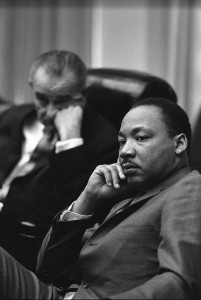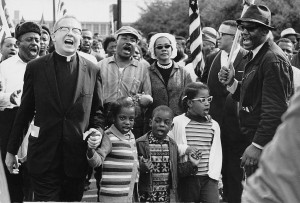A re-post from last year’s “Stories that Need to Be Told: Selma, #BlackLivesMatter, and a Truth Commission,” posted January 21, 2015 (though with an update at the bottom) in honor of this MLK day. With all the heartache and death and division that’s continued to tear our country this year…and yet also many efforts toward healing…let’s take time to remember, friends.
Stories.

Martin Luther King Jr. and President Johnson
They matter, because God uses them to reflect His truth and reach our hearts. And because He Himself is the most masterful Storywriter of all. I loved some of the comments and insights you readers shared on this topic here last week!
But sometimes stories also matter because they need to be told.
I went to the movie Selma this Martin Luther King Jr. Day. I know there is debate over the accuracy of how President Johnson is portrayed in the film, though from what I’ve read it seems the truth is likely more nuanced than shown by either the movie or some of its critics. But regardless, this movie is a story that needed to be told. How is it that a feature film has never been made about Martin Luther King before this?
As I watched the events leading up to and involving the Selma march unfold on the screen, as I saw young men, women, and the elderly clubbed to the ground simply for peacefully protesting the obstruction of their legal right to vote, it was hard to believe this actually happened in America only a few decades ago, when my parents were small children. And while it might be tempting to hope the actual events were less brutal than portrayed onscreen, I know they weren’t. I’ve seen the footage and heard the testimonies from the Freedom Riders documentary, not to mention the historical clips spliced into the end of the movie.
But there was hope in the movie as well—hope that pointed to eternity. After King called for people of faith and of all colors to come join their efforts after the first attempted march was beaten down, tears pricked my eyes as an Orthodox priest, several nuns, a young minister from Boston, and many others joined the crowd, swelling it to a beautiful mingle of black and white marching arm in arm. And that part really happened too.

Marchers from Selma to Montgomery, AL.
So did King’s triumphant, “His truth is marching on—glory, glory, Hallelujah!” at the end of the film, played so powerfully by Christian actor David Oyelowo.
My knowledge of Dr. King has been rather cursory over my life, I confess. I know he achieved much, and that he was flawed, and the movie acknowledges both. But he was powerfully used of God to bring nonviolent, insistent movement toward justice in our country. I’d encourage you—with awareness of some mature content—to see this beautifully made movie with an open heart.
We need to know these stories.
Christian novelist Kim Cash Tate wrote an article recently that struck me, shared by my critique partner Sandra. Drawing on the recent protests against killings of unarmed young black men and women in Ferguson and elsewhere, she wrote how part of making #BlackLivesMatter is acknowledging that #BlackStoriesMatter. Without bitterness, she shares how her contract with a major Christian publishing house was not renewed—though her novels received critical acclaim—because her non-white characters just didn’t sell well enough. (A sadly recurring theme in the Christian market, as we talked about here a few months ago.)
I don’t fully understand why stories about non-white characters, whether in novels or films, still tend to be so marginalized. But I’m thankful for those that are being told. I just discovered an African-American author writing about little known segments of American history this week, and now I’m excited to read Piper Huguley’s historical novels!
And I’ve been realizing that’s one reason why I write the stories I do—to help tell those narratives that haven’t much been told, especially from American history.
In a different way, Mark Charles and his 5 Small Loaves team are also seeking to help tell stories that haven’t been told, seeking to create a national Truth Commission as a platform for Native Americans, African Americans, and others to be able to share about their often smoothed-over history in this nation. To help our country and the church face, lament over, and repent of wrongs that have been done and that still tear at our relationships and society today. To help us move towards truth, and eventually, reconciliation.
You can read Mark’s explanation of this project, and support this ministry here, if you’re so led.
UPDATE: Mark Charles and his family are continuing to pursue the call of racial “conciliation” that the Lord has laid on their hearts, a goal that has led them to move to our nation’s capital for now. If you are interested in learning more, check out their website/blog here and a recent video from Mark here.
